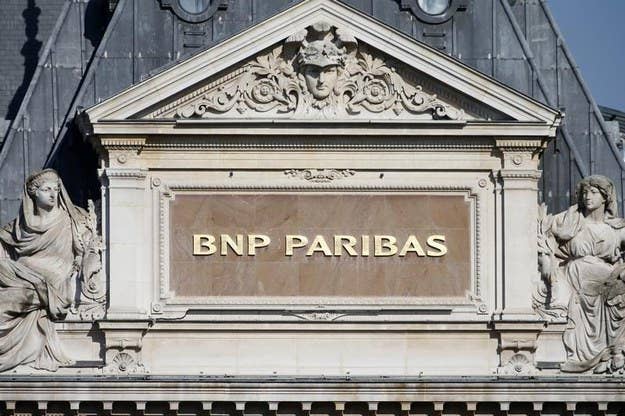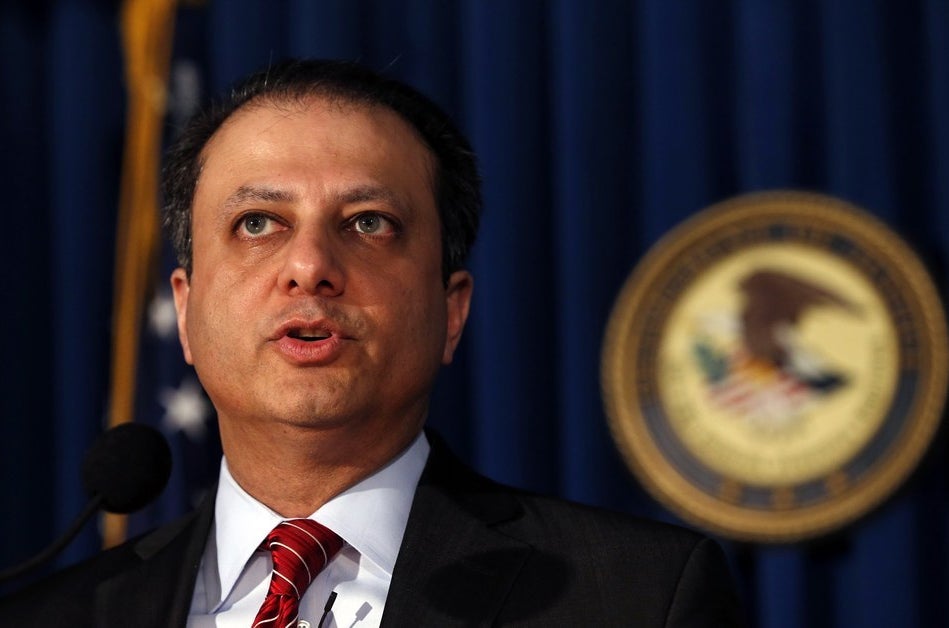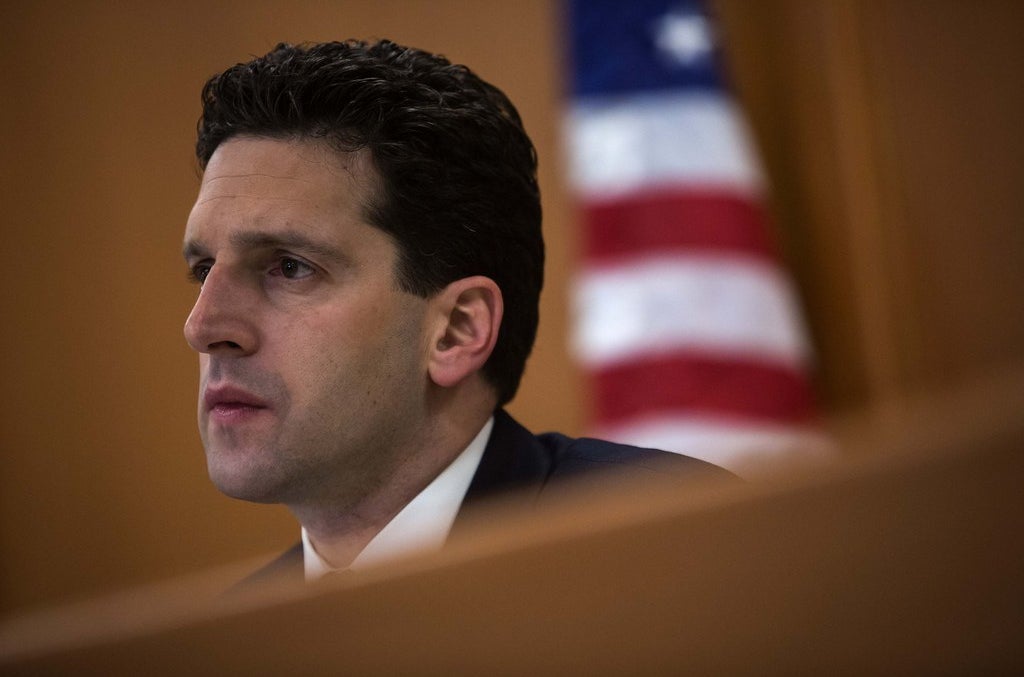
BNP Paribas, the largest bank in France, has pleaded guilty in New York state court to falsifying businesses records and conspiracy, bringing an end to an investigation of the bank's transferring money for Sudan and other countries sanctioned by the U.S. BNP also will plead guilty in federal court to one count of conspiring to violate sanctions rules. This is the second criminal charge that a large bank, albeit foreign, has pled guilty to this year, part of prosecutors' efforts to show that financial institutions are not "too big to jail."
The total penalty is $9 billion paid to U.S. authorities, including the Justice Department, the New York Department of Financial Services, and the Federal Reserve.
Attorney General Eric Holder said Monday in a press conference that BNP Paribas was "conspiring with other entities to deliberately and repeatedly violate longstanding U.S. sanctions against Sudan, Cuba, and Iran."
Holder said that BNP had helped transfer more than $500 million for an Iranian energy company, more than $1.7 billion in transactions in Cuba, and "many billions" for Sudan while it was under U.S. sanctions for human rights violations. U.S Attorney Preet Bharara, whose Southern District U.S. Attorney Office helped investigate BNP, described the bank's actions as a "tour de fraud." The Justice Department said that BNP was helping sanctioned countries and companies transact in U.S. dollars from from 2004 to 2012.
BNP Paribas "acted as a de facto central bank for the government of Sudan," Deputy Attorney General James Cole said in a press conference. The New York State Department of Financial Services said that BNP Paribas ultimately helped conceal $190 billion worth of transactions, and the Justice Department said that $8.83 billion of the total penalty reflected what was "provably" criminal.
DFS said that BNP would have to suspend its dollar clearing — processing international transactions in dollars through New York — for a year starting in the beginning of 2015. An independent monitor will be appointed to oversee the implementation of the penalties, DFS said.
The months of negotiations over the guilty plea have dragged on BNP's stock price, which has fallen 12% this year to just over €49. Large banks across Europe have been nursing losses from the financial crisis and are still mired in investigations for interest rate and currency market manipulation — Credit Suisse in June estimated that the European banking sector was facing just over $100 billion in litigation costs, nearly doubling a February estimate of $58 billion.
BNP said in a statement that it "expects no impact on its operational or business capabilities to serve the vast majority of its clients" as a result of the settlement and " all necessary measures are being taken to ensure smooth transition and no material impact for the clients concerned" to deal with the dollar clearing ban.
Analysts at Nomura said in a note before the announcement that a temporary ban on dollar clearing, while hard to game-out precisely, would at worst lead to a "low-mid single digit" percentage point impact on the bank's earnings. While the fine BNP is paying is well above what other European banks have faced from U.S. authorities, it is also significantly better capitalized than its European peers like UBS, Barclays, or HSBC, who have also reached large settlements with U.S. regulators. BNP is €10 billion above its regulatory capital minimum before paying the penalty.
The Justice Department's investigation and push for a large fine raised the ire of several high-ranking French officials, including the French president Francois Hollande, who wrote a letter to President Obama pleading that any penalty for BNP not be "unfair and disproportionate."
$2.24 billion of the nearly $9 billion penalty will be paid to the New York State Department of Financial Services. DFS also said that 13 BNP employees will leave the bank, including its chief operating officer George Chodron de Courcel. BNP said earlier this month that Chodron de Courcel would leave by the end of the month.
The DFS head, Ben Lawsky, has made extracting huge fines, departure of executives, and monitor-enforced changes of behavior for foreign banks with New York charters a hallmark of his just more than three-year tenure at the head of the newly created financial regulatory agency. While a deal was reached specifically to allow BNP Paribas to plead guilty without endangering its existence in the United States, Lawsky was still able to win additional penalties.
"As a civil regulator, we are taking action today not only to penalize the bank, but also expose and sanction individual BNP employees for wrongdoing," Lawsky said in a statement. "In order to deter future offenses, it is important to remember that banks do not commit misconduct – bankers do."


U.S. Attorney Preet Bharara and New York's Superintendent of Financial Services Ben Lawsky, former colleagues as prosecutors in the Southern District U.S. Attorney's office.
The involvement of DFS displays the evolution of Lawsky and federal prosecutors on how to deal with foreign banks who routed payments to countries in violation of U.S. sanctions. Prosecutors have feared that convicting or even indicting a large corporation on criminal charges could lead to its unraveling and collapse, like when the accounting firm Arthur Andersen went bankrupt after a criminal conviction for its role in the Enron collapse.
This can happen when a corporation's supervisors impose additional sanctions on the company. Foreign banks' operations in the United States are often chartered in New York, giving Lawsky the power to pull the charter, which has in turn given him latitude to negotiate with banks alongside federal prosecutors and to extract hefty penalties on his own.
"Often the greatest existential threat to the company comes not from the prosecutor who has the power to file an indictment, but from the regulator who has the power to revoke a charter," Manhattan U.S. Attorney Preet Bharara said in a March speech. Lawsky and Bharara are former colleagues from their time prosecuting organized crime cases as assistant U.S. attorneys in the Southern District of New York U.S. Attorney office that Bharara now heads.
"The pendulum has swung back a bit from the hesitant aftermath of Arthur Andersen," Bharara said today.
Lawsky reached a $340 million deal with the British bank Standard Chartered in 2012 over accusations that it helped funnel money to Iran in violation of U.S. sanctions laws. Lawsky had threatened to pull its charter. Lawsky has voiced dissatisfaction with large settlements with banks that fail to sanction or hold accountable individual executives. "If you don't hold them accountable, it's Groundhog Day, you're going to get a big settlement and they're going to do it again in a couple years," he told BuzzFeed in March.
This piece has been updated with BNP Paribas's statement.
